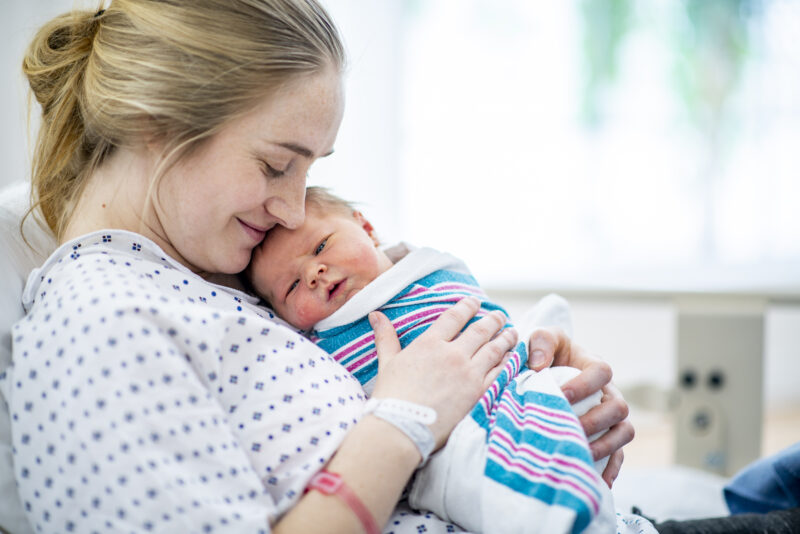 Bringing a baby into this world can bring so much joy and happiness, but also a lot of questions and uncertainty. Why does my baby cry so often? Is it safe for baby to sleep with me? Why am I feeling down?
Bringing a baby into this world can bring so much joy and happiness, but also a lot of questions and uncertainty. Why does my baby cry so often? Is it safe for baby to sleep with me? Why am I feeling down?
As you prepare to bring your new baby into this world, Akron Children’s pediatrician Julie McClave, MD, wants you to know these 5 things to help calm fears and ease worries — and hopefully make the transition from pregnancy to parenthood a little easier.
You’re not alone.
Caring for newborns can be scary and isolating, especially since they can’t communicate with you. So, enlist your support system — or build it now, if you don’t have one. It’s essential in surviving those first few weeks after baby is born.
Line up loved ones to help you care for your newborn, run errands or help with household chores. Call on lactation consultants if you plan to breastfeed, and don’t forget your pediatrician is part of your support network, too, and can answer important questions.
“Jot down questions as they arise so you can bring them to your next appointment,” advised Dr. McClave of Akron Children’s Pediatrics, Mayfield Heights. “If it can’t wait, MyChart makes it easy to send non-urgent questions directly to your provider any time of day. You also can use the after-hours nurse line for pertinent questions.”
For mental support, look for infant classes, breastfeeding groups and other support programs in your community. Building a connection with others going through a similar situation is not only a great way to ease stress, but it also offers you a social outlet.
It’s OK to say no to visitors.
It’s important to limit germ exposure in the early months as much as possible. Young infants are vulnerable to infection.
If possible, avoid childcare settings for the first couple months and know it’s OK to say no to or limit visitors.
“Allowing small groups of close family members and friends who are healthy is appropriate, but it’s a good idea to skip large family functions or group settings until baby is about 6 to 8 weeks,” said Dr. McClave. “Plus, eliminating the rush of visitors can give you time to establish a routine with baby and spend quality time together.”
Keeping baby updated on immunizations and breastfeeding as much as possible are also important ways to help baby build immunity and prevent illness. In addition, make sure family members, especially toddlers, in the house practice good hand hygiene and teach siblings to kiss on the feet and top of the head, instead of the hands and mouth, to avoid spreading germs.
Babies cry A LOT. That’s normal.
Babies cry often because that’s their way of communicating with you. It might be feeding time or naptime, baby needs a diaper change or maybe baby just needs comfort.
Cries can sound differently, depending on your baby’s needs, and it can take a little time to figure out the noise your baby is making. Often cries of communication are softer, more muted, whereas high-pitched squeals can indicate more concern or an immediate need.
“Once babies’ needs are met, they typically stop crying,” said Dr. McClave. “But, if your baby continues to scream despite all your efforts to calm her, such as feeding, changing the diaper and picking baby up, that’s when there could be a cause for concern, and you should call your pediatrician.”
Babies sleep safest alone, on their backs and in a crib.
Research shows babies who sleep on their backs carry the lowest risk for Sudden Infant Death Syndrome (SIDS). When putting baby down for a nap or the night, follow the ABCs of safe sleep: Babies sleep safest Alone, on their Backs and in an empty Crib.
“Make sure the crib doesn’t have a soft mattress or any extra bedding like blankets, pillows, stuffed animals or bumpers,” said Dr. McClave. “If you’re more comfortable being near baby at night, it’s OK if baby sleeps in the same room as you in a play yard or bassinet, but not the same bed as you.”
Prioritizing self-care is important.
First and foremost, you have to take care of the caretaker — yourself. As the saying goes, “You can’t pour from an empty cup.”
Things like eating a well-balanced diet, staying hydrated, getting enough sleep, exercising and taking breaks from caregiving are important for your health and “recharging your battery.” Otherwise, you’ll be more vulnerable to feeling stressed and overwhelmed.
Know that it’s normal for self-care to look a little different after baby is born. Fit in naps if you’re not sleeping a full stretch of 8 hours at night and eat several healthy snacks throughout the day if you’re not sitting down for meals.
“Keep an eye on your mood changes, as well,” said Dr. McClave. “You may feel more emotional and have the ‘baby blues’ the first few weeks after baby is born. But, if these sad feelings persist for weeks, become overwhelming, make it difficult to care for baby or enjoy the things you normally would, reach out to your partner, OB or your baby’s pediatrician for help.”
Get to know our pediatricians and schedule an appointment to get all your questions answered. Virtual visits are available.












